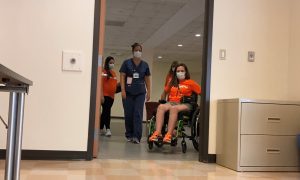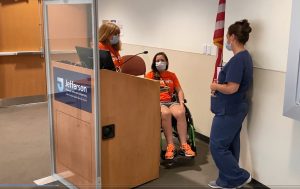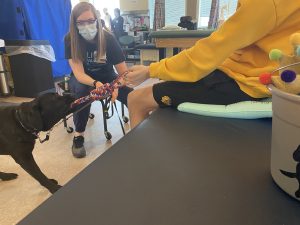
Day Rehab patients have 1:1 PT sessions every day, sometimes with Magee’s facility dog, Oona.
Transitioning from inpatient care to life at home sometimes can be challenging for individuals following a traumatic injury or illness. They no longer need the medical and nursing supervision provided 24/7 while in a hospital, but would greatly benefit by continuing with rigorous rehabilitation. Magee’s Day Rehab Program is an intensive five-day-a-week outpatient service with a supportive team of providers to help patients get accustomed to everyday life and work towards self-sufficiency.
Holistic Approach
Day Rehab is holistic in nature and designed for patients recovering from brain injury, stroke or spinal cord injury. It provides one-on-one physical, occupational and speech therapy sessions, therapeutic group activities, mental health support in group and individual sessions, and community outings, like visiting a local museum or park.
“Day Rehab kept up the momentum of the progress I made during inpatient rehab,” said Jaden Leiby, a former Magee patient who attended Day Rehab in early 2019. “It definitely helped me grow as a person and achieve goals.”
Overcoming New Challenges
Venturing out as a group with support from rehab professionals allows patients to gain experience and confidence navigating daily life outside the home and hospital. This may include learning how to access the community in a wheelchair and gain time management skills needed to catch a train.
“The patients are involved in planning the outings before they embark later in the week,” said Joann Rudi, RN, CRRN, Magee Day Rehab Coordinator. “Each outing presents unique challenges and this helps the patients work towards their individual goals, whether that’s physical, cognitive or emotional.”
Physical and Emotional Healing
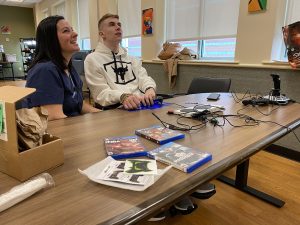
Recreational therapy sessions are among many components of Day Rehab
Day Rehab’s holistic approach also includes opportunities to take part in music, art, horticultural and recreational therapies. This helps to meet patients’ physical and emotional needs as they progress on their own healing journeys.
“Even if my mood was low or I was in intense pain, Day Rehab helped me stay driven and get stronger,” said Amanda Lyons, a former Day Rehab patient with a spinal cord injury. “Participating in art therapy and rec therapy really helped me mentally, because those are things that I enjoy doing and they helped me disconnect from the leg pain I was experiencing.”
Easing the Transition to Home Life
When patients return home at night, they may face difficulties that only reveal themselves in a home or a community setting. Day Rehab provides a safe space to address those issues. “When patients come back to Day Rehab the next day, we are here to help them find solutions that get them closer to self-sufficiency,” said Joann.
While Day Rehab is a group program, patients have individualized rehab plans and goals to meet, which dictate length of participation from one to eight weeks. Individualized goals are based on several factors, including the severity of their injury or illness, home life, hobbies, educational pursuits, and return to work if possible. Day Rehab’s team of providers meet every two weeks to discuss each patient’s progress. This determines next steps in the patient’s rehab plan or if they’re ready to transition to a regular outpatient therapy program, or leave the program altogether.
 “Seeing our patients reach specific goals is always the most rewarding part of the work we do,” added Joann. “One patient wanted to be able to walk his daughter down the aisle on her wedding day. Our therapists worked together to practice that specific activity and successfully reach that goal.”
“Seeing our patients reach specific goals is always the most rewarding part of the work we do,” added Joann. “One patient wanted to be able to walk his daughter down the aisle on her wedding day. Our therapists worked together to practice that specific activity and successfully reach that goal.”
Jim Jones’ rehab plan was designed to help him prepare for his daughter’s upcoming wedding. He wanted to be well enough to walk her down the aisle. In this photo, Jim and his physical therapist practice the activity at the church where his daughter was to be married.
Antonio Ellis, a New Jersey police officer, underwent many months of physical and cognitive rehabilitation in 2020 as he recovered from a severe bout with COVID-19. When Antonio transitioned from inpatient to Day Rehab, his goals focused on helping him return to the police force.

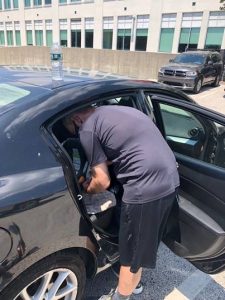
In these photos, Antonio performed a simulated car seat inspection, as that was among his many duties as a police lieutenant. His job also entailed public speaking and leading training sessions. Antonio worked with his Day Rehab speech therapist to give a prepared presentation on distracted driving to a small group at Magee’s Riverfront outpatient facility.
Amanda Lyons became paralyzed from the waist down when she was struck by a stray bullet in the spring of 2021. No longer having the use of her legs changed every aspect of her life. When she started Day Rehab, some of her goals focused on getting back to the classroom at Thomas Jefferson University where she served as an assistant professor of Occupational Therapy. Amanda’s therapists accompanied her to the building where she taught, so she could get a sense of what it would be like to access the building and work while using a wheelchair.
